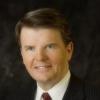National Review Board member Robert S. Bennett pauses while giving a briefing on the board's report on causes of the clergy sexual abuse crisis in Washington in this Feb. 27, 2004, file photo. Bennett died Sept. 10 at age 84. (CNS/Paul Haring)
Robert S. Bennett, one of the nation's legal giants, died Sept. 10 at age 84. Formed by a Jesuit education, Bennett's exhilarating life exemplified professional excellence and caring for others.
Bennett's preeminence as a trial attorney offers a long list of jaw-dropping stories of impactful courtroom defense and illustrates the importance of commitment and care of individuals, personal integrity and plain common sense to the practice of law.
His persuasive command of facts and law won the day in and out of the courtroom for decades. In cases involving national and international political and financial intrigue — Abscam, Iran-Contra, the Keating Five, the CIA/Plame leak case and dozens of congressional and presidential legal dramas Bennett's solid internal grounding made him the champion of many.
Bennett's clients comprised a panoply of the high and mighty — people staggered by the legal trouble they faced. They included presidents, cabinet and congressional members, baseball team owners, journalists, bankers and more. All beat a path to his door because of his skill as a litigator, and because of his reputation as a respected, well-connected and caring protector.
The formative influences of this extraordinary son of the New York neighborhood of Bedford-Stuyvesant included his family and Jesuit education.
Bennett's parents and uncles were influential in enrolling him in the legendary Brooklyn Jesuit Prep High School in New York, where his love for learning and ethical bearing found a home. Two Jesuit priests in particular, Frs. Owen Daly and Jim Dolan, taught Bennett the power of a well-argued point of view. Under their influence, Bennett brought glory to Prep's debate team, winning a New York state championship.
According to his 2008 memoir, In the Ring: The Trials of a Washington Lawyer, Bennett's Jesuit mentoring opened doors at Georgetown University, where he worked his way through undergraduate and law school, holding down everyday jobs as a janitor, furniture mover and teacher at nearby Gonzaga High School. Later, he was staff assistant to one of the New Deal Washington legends, Thomas ("Tommy the Cork") Corcoran.
Although Bennett would remain deeply grateful for the Jesuit influences in his early education, his relationship with his Catholic faith was fraught at times. In his memoir, Bennett narrates how the divorce of his parents caused one Jesuit at Brooklyn Prep to restrict his Methodist father to a back row seat at a debate championship. The priest explained to the young Bob Bennett that it was necessary to avoid scandal.
Robert S. Bennett, left, a member of the bishops' National Review Board assigned to monitor how the bishops deal with sexual abuse and child protection, attends a press conference in St. Louis June 19, 2003. Bishop Wilton D. Gregory, then president of the U.S. Conference of Catholic Bishops, looks up as he answers a question. Bennett died Sept. 10 and Gregory will preside at his funeral Mass Sept. 17. (CNS/Reuters)
But life has its ironies, as Bennett found out decades later, when in 2002 the U.S. Conference of Catholic Bishops (USCCB) found itself awash in covered-up diocesan clergy sexual abuse scandals — first reported by the National Catholic Reporter in 1985, and then highlighted in 2002 in alarming revelations by The Boston Globe.
It was to Bennett that U.S. bishops turned to help dioceses understand their responsibilities to their flock and to help the church's leaders regain the public's trust.
As a founding member of the bishops' National Review Board for the Protection of Children and Young People, Bennett helped establish and find staff for a national office, establish diocesan annual reporting and auditing systems, and conduct groundbreaking research through the John Jay College of Criminal Justice of the City University of New York on the causes and history of clergy abuse in the U.S.
Advertisement
The work of the review board would not in itself bring about justice or restore the trust that decades of scandalous clerical behavior and cover-up had caused. But it would result in desperately needed preventative measures and a more overt, accountable institutional church.
Bennett's indebtedness to his Catholic beginnings also emerged in his generous support for retired members of religious orders. For decades American religious women and men who staffed parochial and high schools, parishes and dioceses worked for stipends without retirement benefits or pension plans.
When religious vocations started to dry up in the 1970s, thousands of aging sisters and other religious were left in financial straits with little or nothing to provide for their care. With grateful memories of the religious who taught and readied him for a life of working for fairness and justice, Bennett stepped forward to help in the early years of SOAR! (Support Our Aging Religious).
The lay-led organization would eventually raise millions for retirement care in hundreds of motherhouses, convents and care facilities throughout the country. Bennett's generous support and volunteer involvement and that of his wife, Ellen, who served on the SOAR! board of directors, helped open doors to Washington's elite and build a network of other grateful rank-and-file Catholics in an ongoing assistance campaign.
Bennett's legacy in the practice of law and his celebrity status as the defender of people in trouble will certainly lead in the remembrances and tributes to him in the time of memorials following his recent death. It is equally important to remember the liberating impact of his Catholic formation. It allowed this grandson of immigrants to reach the halls of power and still keep his feet firmly planted in the love of his family and service to others.





